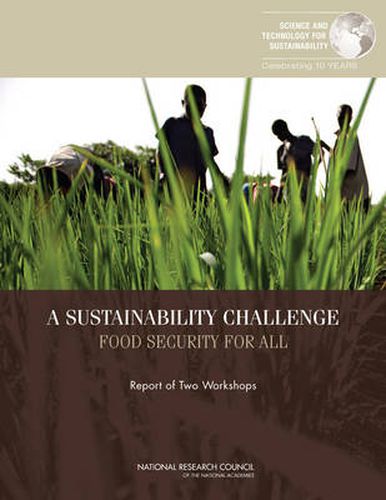Readings Newsletter
Become a Readings Member to make your shopping experience even easier.
Sign in or sign up for free!
You’re not far away from qualifying for FREE standard shipping within Australia
You’ve qualified for FREE standard shipping within Australia
The cart is loading…






The National Research Council’s Science and Technology for Sustainability Program hosted two workshops in 2011 addressing the sustainability challenges associated with food security for all. The first workshop, Measuring Food Insecurity and Assessing the Sustainability of Global Food Systems, explored the availability and quality of commonly used indicators for food security and malnutrition; poverty; and natural resources and agricultural productivity. It was organized around the three broad dimensions of sustainable food security: (1) availability, (2) access, and (3) utilization. The workshop reviewed the existing data to encourage action and identify knowledge gaps. The second workshop, Exploring Sustainable Solutions for Increasing Global Food Supplies, focused specifically on assuring the availability of adequate food supplies. How can food production be increased to meet the needs of a population expected to reach over 9 billion by 2050? Workshop objectives included identifying the major challenges and opportunities associated with achieving sustainable food security and identifying needed policy, science, and governance interventions. Workshop participants discussed long term natural resource constraints, specifically water, land and forests, soils, biodiversity and fisheries. They also examined the role of knowledge, technology, modern production practices, and infrastructure in supporting expanded agricultural production and the significant risks to future productivity posed by climate change. This is a report of two workshops.
$9.00 standard shipping within Australia
FREE standard shipping within Australia for orders over $100.00
Express & International shipping calculated at checkout
The National Research Council’s Science and Technology for Sustainability Program hosted two workshops in 2011 addressing the sustainability challenges associated with food security for all. The first workshop, Measuring Food Insecurity and Assessing the Sustainability of Global Food Systems, explored the availability and quality of commonly used indicators for food security and malnutrition; poverty; and natural resources and agricultural productivity. It was organized around the three broad dimensions of sustainable food security: (1) availability, (2) access, and (3) utilization. The workshop reviewed the existing data to encourage action and identify knowledge gaps. The second workshop, Exploring Sustainable Solutions for Increasing Global Food Supplies, focused specifically on assuring the availability of adequate food supplies. How can food production be increased to meet the needs of a population expected to reach over 9 billion by 2050? Workshop objectives included identifying the major challenges and opportunities associated with achieving sustainable food security and identifying needed policy, science, and governance interventions. Workshop participants discussed long term natural resource constraints, specifically water, land and forests, soils, biodiversity and fisheries. They also examined the role of knowledge, technology, modern production practices, and infrastructure in supporting expanded agricultural production and the significant risks to future productivity posed by climate change. This is a report of two workshops.